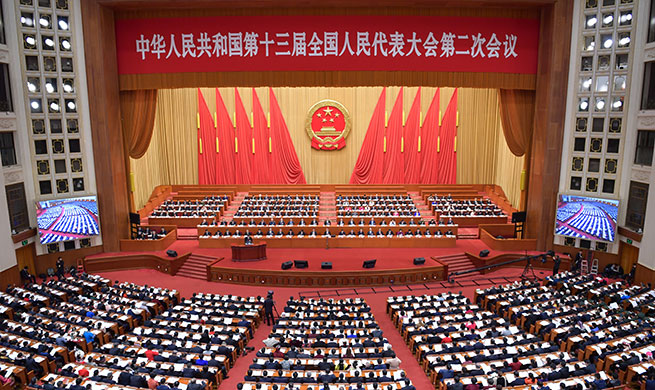LONDON, March 12 (Xinhua) -- British parliament on Tuesday overwhelmingly rejected Prime Minister Theresa May's Brexit deal, throwing the country's Brexit process into further chaos.
The vote outcome brought further confusions on how Britain will leave the European Union (EU) and how the island country will forge new relations with the world's largest trading bloc after the divorce.
MPs voted by 391 votes to 242, a margin of 149, to reject the revised Brexit deal May presented to the House of Commons, with 75 MPs from May's Conservative Party voting against the deal.
With the prime minister's second defeat over Brexit since January, the British people are facing a hard choice between no-deal Brexit or a delayed Brexit.
MPs are expected to return to the British parliament Wednesday to vote on whether they want to rule out Britain leaving the EU without a deal. If the motion fails to pass the parliament on Wednesday, MPs will vote on Thursday on whether to put off the Brexit date.
The result was a little bit less brutal for May than in January when MPs threw out her Brexit deal by a margin of 230, the highest ever defeat in British political history.
Before the vote, May had hoped that having won changes to her deal, including legally binding commitments, she may just have climbed what seemed an impossible mountain.
She had made a last-minute dash Monday to Strasbourg, France, to hold talks with European Commission President Jean-Claude Juncker.
Before Monday's surprise trip, British politicians had predicted a loss in the vote by between 100 and 150 votes. With the latest changes, most still thought May would struggle to win Tuesday night. May told MPs she profoundly regretted the result.
MPs voted down May's Brexit deal, which was reached by London and Brussels after long and painful negotiations, by a big margin and demanded legally binding changes.
May harbored a hope that armed with changes that enabled her to present an amended deal to MPs. But those hopes were dashed when her Attorney General Geoffrey Cox believed what was a devastating body blow to May.
The big stumbling block to the deal was the question of a so-called backstop to ensure there was no return to a hard border between Northern Ireland and Ireland.
Once Britain leaves the EU, the 500-kilometer border will become an EU frontier. Cox warned that even with the changes made in Strasbourg, Britain could still be trapped in the backstop indefinitely.
He said the new documents did not deliver legally binding changes to the Withdrawal Agreement between Britain and the EU.
That was enough to lead the Democratic Unionist Party (DUP) of Northern Ireland, which props up May's minority government, and the pro-leave European Research Group (ERG) of Conservative MPs, to announce they would vote against May's Brexit bill.
Once the plug had been pulled by the DUP and the ERG, there was no hope of May winning. Both had insisted they would not support any deal that could have left Britain locked into EU rules without having any unilateral way of escaping control from Brussels.
Other MPs had different reasons for opposing May's deal, but the Irish backstop issue in the end proved to be a problem too far.
The British Parliament, with just over a fortnight to the March 29 departure date, has now been plunged into uncertain, and stormy waters.
May admitted that MPs now face an unenviable choice of what to do next.
Jeremy Corbyn, leader of the main opposition Labor Party, responded to May's defeat with a call for a general election.
He said the Brexit deal was now dead, an opinion echoed by Ian Blackford, leader at Westminster of the Scottish Nationalist Party (SNP), who described the result as a humiliation for May.
There have also been calls for May to be replaced as prime minister.
On Wednesday, MPs will debate on whether they want to rule out a no-deal Brexit, and depending on the result, a second vote to be held on Thursday on seeking an extension of the departure date.
May said she is conscious of the potential damage that leaving the EU without a deal would do, but she added that she will urge the House of Commons to vote against a no-deal Brexit.
The prediction is MPs will rule out leaving the EU unless there is a deal, leaving an extension of Britain's departure more likely. What remains unknown is just how long that extension would be.













